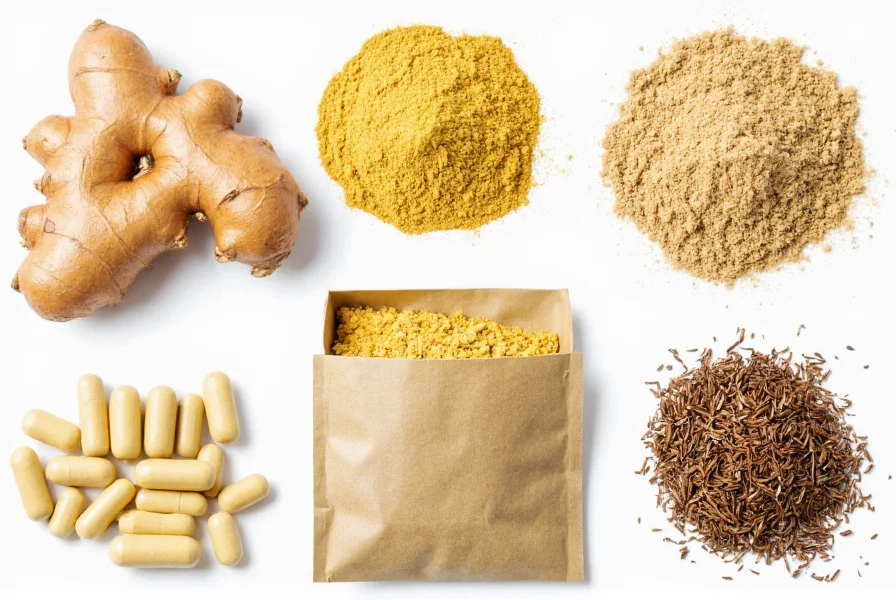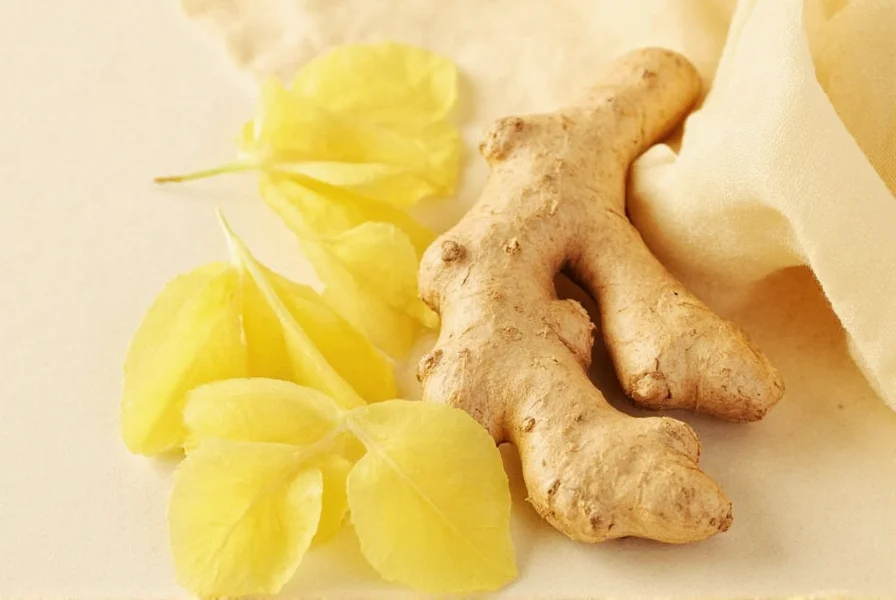Ginger (Zingiber officinale) has been used in traditional medicine for over 2,000 years across Asian and Middle Eastern cultures. Modern science now validates many of these historical uses, revealing how this pungent rhizome supports human health through multiple biological pathways. Unlike many herbal remedies with limited evidence, ginger's health benefits are among the most thoroughly researched in nutritional science.
The Science Behind Ginger's Active Compounds
Ginger contains over 400 distinct biochemical compounds, with gingerols and shogaols being the most pharmacologically active. These compounds work through several mechanisms:
- Anti-inflammatory action: Gingerols inhibit COX-2 enzymes similarly to NSAIDs but without the same gastrointestinal risks
- Nausea reduction: Modulates serotonin receptors in the digestive tract and central nervous system
- Antioxidant effects: Neutralizes free radicals while boosting the body's natural antioxidant enzymes
- Digestive enhancement: Stimulates saliva, bile, and gastric enzyme production

Evidence-Based Health Benefits of Ginger
Nausea and Vomiting Relief
Ginger demonstrates remarkable effectiveness against various forms of nausea. A 2022 meta-analysis of 20 clinical trials found ginger reduced pregnancy-related nausea by 27% compared to placebo. For chemotherapy-induced nausea, studies show ginger supplementation (0.5-1g daily) alongside standard antiemetics reduced symptom severity by 32%. Motion sickness research indicates 1-2 grams taken before travel decreases symptoms by 35-40%.
Inflammation and Pain Management
Ginger's anti-inflammatory properties make it valuable for chronic pain conditions. Research published in Arthritis demonstrated that 2 grams of ginger daily reduced osteoarthritis pain by 30% after 12 weeks. Another study found ginger extract decreased muscle pain from exercise by 25% when taken consistently for 11 days. The mechanism appears to involve suppression of inflammatory cytokines like TNF-α and IL-6.
Digestive Health Improvements
Ginger accelerates gastric emptying, making it particularly helpful for functional dyspepsia. A clinical trial showed 1.2 grams of ginger powder taken before meals reduced indigestion symptoms by 28% and sped gastric emptying by 25%. This effect occurs through ginger's ability to stimulate antral contractions while relaxing the pyloric sphincter.
| Ginger Form | Best For | Effective Daily Dose | Notes |
|---|---|---|---|
| Fresh root | Digestion, nausea | 1-3 grams | Peel and slice; contains highest gingerol concentration |
| Dried powder | Pain relief, inflammation | 0.5-2 grams | Standardized extracts provide consistent potency |
| Essential oil | Nausea, topical pain | 50-200 mg | Dilute before skin application; not for internal use |
| Capsules | Consistent dosing | As labeled | Look for 5% gingerol content minimum |
Cardiovascular and Metabolic Benefits
Emerging research suggests ginger may support heart health through multiple pathways. Studies indicate ginger supplementation (3 grams daily) can lower fasting blood sugar by 12% in type 2 diabetes patients and reduce HbA1c by 0.9%. It appears to modestly improve lipid profiles by decreasing LDL cholesterol while raising HDL. Ginger's blood-thinning properties require caution for those on anticoagulants, but may benefit cardiovascular health through reduced platelet aggregation.

Practical Applications and Safety Considerations
For maximum benefit, incorporate ginger consistently rather than occasionally. The most effective forms include:
- Ginger tea: Steep 1-2 tablespoons of freshly grated ginger in hot water for 10 minutes
- Culinary use: Add to stir-fries, smoothies, or salad dressings (1-2 tablespoons)
- Supplements: Choose standardized extracts providing 5% gingerols
Most adults tolerate 1-3 grams of ginger daily well, though higher doses may cause mild heartburn or mouth irritation. Those with gallstones should consult a physician before regular consumption, as ginger stimulates bile production. Ginger may interact with blood thinners like warfarin, so discuss with your healthcare provider if taking these medications.
Limitations of Current Research
While ginger's benefits for nausea and inflammation are well-established, other potential uses require more research. Studies on ginger for weight loss show mixed results, with modest effects only when combined with dietary changes. Research on ginger's cancer-fighting properties remains primarily in vitro or animal studies. The optimal timing and preparation methods for specific conditions need further investigation—whether raw, cooked, or fermented ginger provides maximum benefit for particular health concerns.
Conclusion: Integrating Ginger Into Your Wellness Routine
Ginger represents one of the most scientifically validated functional foods available. Its multi-system benefits—from digestive support to inflammation reduction—make it a valuable addition to most diets. Unlike many supplements with narrow applications, ginger's broad mechanism of action supports multiple aspects of health simultaneously. For best results, incorporate fresh ginger regularly rather than relying solely on supplements, and consult your healthcare provider about appropriate dosing for specific health concerns.
Frequently Asked Questions
How much ginger should I take daily for inflammation?
Research suggests 1-2 grams of ginger powder or 2-4 grams of fresh ginger daily provides anti-inflammatory benefits. This equals about 1-2 teaspoons of grated fresh ginger or one standardized supplement capsule containing 5% gingerols. Consistent daily use for at least 4-6 weeks shows the most significant results for chronic inflammation.
Can ginger help with morning sickness during pregnancy?
Yes, multiple studies confirm ginger's effectiveness for pregnancy nausea. The American College of Obstetricians and Gynecologists recommends 1 gram daily as a safe first-line treatment. This can be taken as 250mg capsules four times daily or 1 tablespoon of fresh ginger in tea. Most women notice improvement within 4 days of consistent use.
What's the difference between fresh and dried ginger health benefits?
Fresh ginger contains higher levels of gingerols, making it more effective for nausea and digestion. Dried or cooked ginger converts some gingerols to shogaols, which have stronger anti-inflammatory properties but less effect on nausea. For maximum benefit, use fresh ginger for digestive issues and dried/aged ginger for pain and inflammation.
How long does it take for ginger to work for joint pain?
For chronic joint pain like osteoarthritis, research shows significant improvement after 8-12 weeks of consistent daily use (1-2 grams). Some people notice mild relief within 24-48 hours for acute muscle soreness, but the anti-inflammatory effects build cumulatively over weeks. Combining ginger with turmeric may enhance results due to complementary mechanisms.
Can ginger interact with blood pressure medications?
Ginger may enhance the effects of blood pressure medications due to its mild vasodilatory properties. While generally safe, those taking antihypertensive drugs should monitor their blood pressure when starting regular ginger consumption and consult their physician. The risk appears low at typical dietary amounts (under 2 grams daily), but higher supplement doses warrant medical supervision.











 浙公网安备
33010002000092号
浙公网安备
33010002000092号 浙B2-20120091-4
浙B2-20120091-4